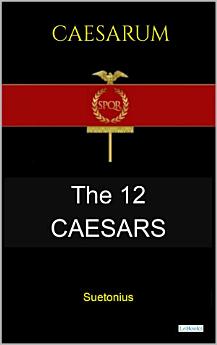THE TWELVE CAESARS - Suetonius
ກ.ພ. 2024 · Lebooks Editora
ປຶ້ມອີບຸກ
256
ໜ້າ
family_home
ມີສິດ
info
reportບໍ່ໄດ້ຢັ້ງຢືນການຈັດອັນດັບ ແລະ ຄຳຕິຊົມ ສຶກສາເພີ່ມເຕີມ
ກ່ຽວກັບປຶ້ມ e-book ນີ້
Written by the great Roman historian Suetonius in the year 121, " The Twelve Caesars" is an extremely important historical document and one of the main sources of knowledge about Roman history. In this magnificent work, which covers the period from the rise to the fall of the Roman Empire, we get to know the intimacy of the life of each of the twelve Caesars: their ancestors, their military campaigns, the events that led them to power and death, as well as the character and personality of each of them. Beyond historical facts, Suetonius managed to portray the human character of the 12 Caesars in an environment characterized by unlimited power, violence, and the debauchery and luxury of the emperors in ancient Rome. It is an exceptional work that deserves to be read.
ກ່ຽວກັບຜູ້ຂຽນ
Caio Suetônio Tranquilo was born in Rome, presumably in the year 69 AD, and died around the year 141. Son of a tribune of the 13th Legion, he embraced both the military and literary careers. A contemporary and friend of Pliny, the latter wanted to introduce him to the career of public offices, which Suetonius modestly refused. He shone especially in the forum, having been one of the most eminent figures of the senatorial nobility. Appointed secretary ab epistolis during the time of Emperor Hadrian, he entered the intimacy of the court, where, however, he quickly fell out of favor for monopolizing the attentions of Empress Sabina. In his spare time from public duties, Suetonius dedicated himself to the study of history. A scholar of the customs of his people and his time, he wrote many scholarly works, in which he reviewed the main characters of the era. Above all, he was an indiscreet revealer of the intimacies of the Roman court, giving us an intimate and unceremonious view of the vices of the emperors and the petty quarrels that divided the nobility. His main works are: "De Ludis Grecorum" (On Greek Games); "De Spectaculis et Certaminibus Romanorum" (On Roman Spectacles and Contests); "De Anno Romano" (On the Roman Year); "De Nominibus Propiis et de Generibus Vestium" (On Proper Names and the Classes of Garments); "De Roma et ejus Institutis" (On Rome and Its Institutions); "Stemma Ilustrium Romanorum" (Stem of Illustrious Romans); "De Claris Rhetoribus" (On Famous Rhetoricians); and "A Vida dos Doze Césares" (The Lives of the Twelve Caesars). This is the only one that has survived to our days. Unfortunately, the others have been lost, which represented an incalculable historical loss, as we know they were valuable works for the study of classical antiquity, as the reader can observe from this precious work, "The Lives of the Twelve Caesars."
ໃຫ້ຄະແນນ e-book ນີ້
ບອກພວກເຮົາວ່າທ່ານຄິດແນວໃດ.
ອ່ານຂໍ້ມູນຂ່າວສານ
ສະມາດໂຟນ ແລະ ແທັບເລັດ
ຕິດຕັ້ງ ແອັບ Google Play Books ສຳລັບ Android ແລະ iPad/iPhone. ມັນຊິ້ງຂໍ້ມູນໂດຍອັດຕະໂນມັດກັບບັນຊີຂອງທ່ານ ແລະ ອະນຸຍາດໃຫ້ທ່ານອ່ານທາງອອນລາຍ ຫຼື ແບບອອບລາຍໄດ້ ບໍ່ວ່າທ່ານຈະຢູ່ໃສ.
ແລັບທັອບ ແລະ ຄອມພິວເຕີ
ທ່ານສາມາດຟັງປຶ້ມສຽງທີ່ຊື້ໃນ Google Play ໂດຍໃຊ້ໂປຣແກຣມທ່ອງເວັບຂອງຄອມພິວເຕີຂອງທ່ານໄດ້.
eReaders ແລະອຸປະກອນອື່ນໆ
ເພື່ອອ່ານໃນອຸປະກອນ e-ink ເຊັ່ນ: Kobo eReader, ທ່ານຈຳເປັນຕ້ອງດາວໂຫຼດໄຟລ໌ ແລະ ໂອນຍ້າຍມັນໄປໃສ່ອຸປະກອນຂອງທ່ານກ່ອນ. ປະຕິບັດຕາມຄຳແນະນຳລະອຽດຂອງ ສູນຊ່ວຍເຫຼືອ ເພື່ອໂອນຍ້າຍໄຟລ໌ໄໃສ່ eReader ທີ່ຮອງຮັບ.








